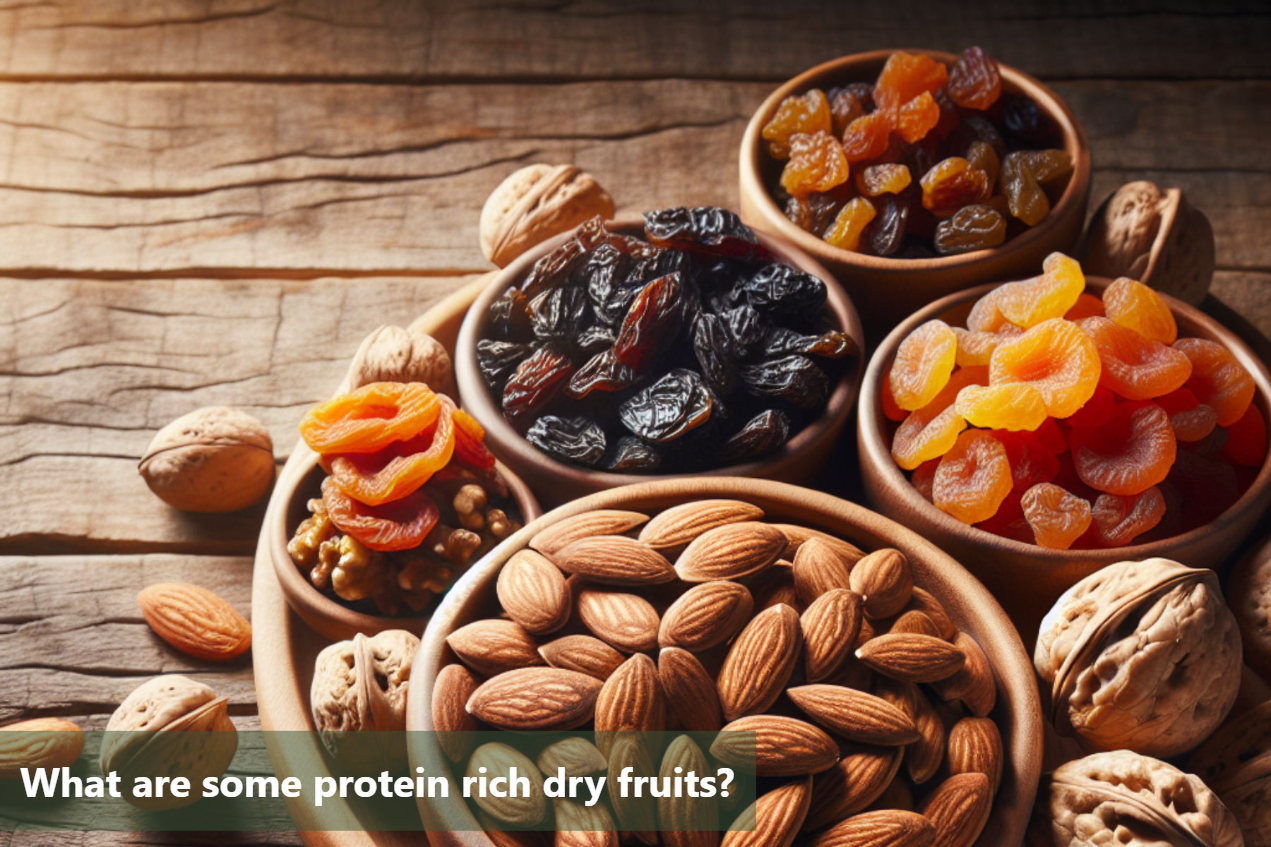
What are some protein rich dry fruits?
Incorporating protein-rich dry fruits into our meals can be a nutritious and convenient way to meet our protein needs. These dry fruits not only provide a good source of plant-based protein but also offer a range of vitamins, minerals, and antioxidants.
Almonds, for instance, are renowned for being one of the top protein-rich dry fruits. With a high protein content, almonds are a satisfying snack and a versatile ingredient in various dishes. Pistachios, another protein powerhouse among dry fruits, offer a balanced mix of protein, healthy fats, and fiber. Cashews, although not as protein-dense as almonds or pistachios, still contribute a decent amount of protein to your diet along with their creamy texture that enhances both savory and sweet recipes.
Including a variety of protein-rich dry fruits like almonds, pistachios, and cashews in your daily meals can promote satiety, support muscle function, and provide essential nutrients. By making these nutritious choices, you can enjoy a well-rounded diet and reap the benefits of these healthy snacks.

Top Protein-rich Dry fruits
Nut |
Protein |
Nutrients |
|---|---|---|
Almonds |
Provides about 6 grams of protein per ounce (approximately 23 almonds) |
High in vitamin E, healthy fats (monounsaturated), fiber, antioxidants (such as flavonoids), and minerals like calcium and magnesium |
Pistachios |
Offers approximately 6 grams of protein per ounce (about 49 pistachios) |
Rich in vitamin B6, antioxidants (including lutein and zeaxanthin), fiber, healthy fats (monounsaturated and polyunsaturated), and minerals such as potassium and phosphorus |
Cashews |
Provides around 5 grams of protein per ounce (approximately 18 cashews) |
High in vitamin K, healthy fats (monounsaturated and polyunsaturated), antioxidants (such as tocopherols), and minerals like copper and magnesium |
Walnuts |
Contains about 4 grams of protein per ounce (approximately 14 walnut halves) |
Rich in omega-3 fatty acids, antioxidants (including ellagic acid), fiber, vitamins (such as vitamin E), and minerals like manganese and copper |
Peanuts |
Offers approximately 7 grams of protein per ounce (about 28 peanuts) |
High in vitamin E, healthy fats (monounsaturated and polyunsaturated), fiber, antioxidants (such as resveratrol), and minerals like manganese and phosphorus |
Health Benefits
Rich Source of Energy: Dry fruits are concentrated sources of natural sugars, healthy fats, and carbohydrates, providing a quick and sustained energy boost.
Heart Health: Many dry fruits, such as almonds, walnuts, and pistachios, contain heart-healthy fats, fiber, and antioxidants that support cardiovascular health and lower the risk of heart disease.
Improved Digestion: Dry fruits are rich in dietary fiber, promoting digestive health, preventing constipation, and supporting regular bowel movements.
Boosted Immunity: Dry fruits contain vitamins (such as vitamin C and vitamin E) and minerals (like zinc) that help strengthen the immune system and protect against infections and diseases.
Weight Management: Despite being energy-dense, dry fruits can aid in weight management when consumed in moderation due to their satiating effect and nutrient density.
Bone Health: Dry fruits like almonds and pistachios are excellent sources of calcium and magnesium, supporting bone health and preventing osteoporosis.
Brain Function: Certain dry fruits, such as walnuts and almonds, are rich in omega-3 fatty acids and antioxidants that support brain function, cognition, and memory.
Reduced Risk of Chronic Diseases: The antioxidants present in dry fruits help reduce inflammation, oxidative stress, and the risk of chronic diseases such as diabetes, cancer, and neurodegenerative disorders.

Dry Fruits and Protein: A Nutritional Overview
Almonds emerged as a top contender, packed with protein, healthy fats, and essential nutrients. Whether enjoyed as a snack or sprinkled over salads, almonds are a versatile addition to any diet.
Pistachios also stood out for their impressive protein content, along with their array of vitamins, minerals, and antioxidants. These vibrant green nuts not only satisfy hunger but also contribute to heart health and weight management. Cashews, with their rich protein profile, stole the show as a protein-packed delight for cooking or snacking. From creamy cashew sauces to crunchy toppings, the culinary possibilities are endless with cashews.
Incorporating these protein-rich dry fruits into your daily meals can enhance your nutritional intake, support muscle repair, and promote overall vitality. So, seize the opportunity to savor the goodness of these dry fruits rich in protein for a healthier and more vibrant lifestyle.
FAQs
-
Which dry fruits are high in protein?
Almonds, cashews, pistachios, and walnuts are some of the protein-rich dry fruits.
-
How much protein do dry fruits contain?
On average, dry fruits like almonds and cashews contain around 5-7 grams of protein per ounce.
-
Can I include protein-rich dry fruits in my diet if I am vegetarian/vegan?
Yes, protein-rich dry fruits can be a great source of plant-based protein for vegetarians and vegans.
-
Are protein-rich dry fruits suitable for weight loss diets?
While high in protein, dry fruits are also calorie-dense, so portion control is important to incorporate them into a weight loss diet.
-
Can consuming protein-rich dry fruits help in muscle building?
Yes, the protein content in dry fruits can contribute to muscle growth and recovery when combined with a balanced diet and exercise.
-
What are some tasty ways to enjoy protein-rich dry fruits?
Protein-rich dry fruits can be enjoyed as a snack on their own, added to oatmeal or yogurt, or used in homemade trail mixes for a nutritious boost.
This Blog post is an initiative by Lo! Foods, to provide accurate and Nutritionist / Doctor approved information related to Health. Lo! Foods is India's leading brand for Everyday Functional Foods. Foods designed for specific Health conditions or Needs. Lo! Foods also runs India's largest range of Low Carb Healthy Cloud Kitchens, under the brand names of Lo!, ProteinChef, ATH (All Things Healthy) and DiabeSmart.













Leave a comment
Your email address will not be published.